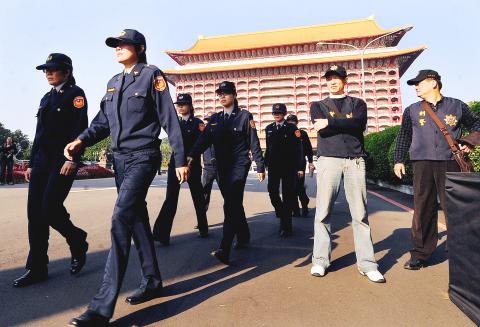The Democratic Progressive Party (DPP) yesterday stepped up its criticism over security arrangements for today’s high--profile meeting between cross-strait envoys, labeling the heavy police presence a form of “appeasement” toward Beijing.
About 2,000 police officers are expected to be deployed in parts of Taipei over the next two days to provide security for Association for Relations Across the Taiwan Strait (ARATS) Chairman Chen Yunlin (陳雲林), the National Police Agency (NPA) said last week.
Chen will be on a three-day visit with Taipei-based Straits Exchange Foundation Chairman Chiang Pin-kung (江丙坤).

PHOTO: LIAO CHEN-HUEI, TAIPEI TIMES
The Liberty Times (the Taipei Times’ sister newspaper) said an estimated 1,150 police officers from the Taipei City Police Department, with backup from the Aviation Police Office and the National Highway Police Bureau, were expected to comprise the bulk of the police task force.
During a press conference yesterday, DPP spokesperson Cheng Wen-tsang (鄭文燦) described the heavy police presence as a move that would stifle opposing voices and send the signal that the government lacked confidence in Taiwan’s liberties and democratic values.
“They are fulfilling Beijing’s -requests to appease China,” Cheng said.
The police action, known internally as “Operation Chi Hsin,” will also involve plainclothes police monitoring Chen’s public appearances, including the 40km route his motorcade is expected to take as it heads from Taiwan Taoyuan International Airport to the Grand Hotel, where he will be staying.
Police squads will also be deployed to areas surrounding the hotel as well as another undisclosed hotel near Miramar Entertainment Park, where Chen is expected to meet Mainland Affairs Council Chairperson Lai Shin-yuan (賴幸媛) today, the Liberty Times wrote.
Chinese officials, led by -ARATS Deputy Chairman Zheng Lizhong (鄭立中), arrived in Taiwan yesterday to oversee final security preparations and confirm Chen’s itinerary.
The NPA, reportedly concerned about protests by pro--independence organizations, said it intended to increase the use of video recorders to avoid controversy.
Police officers were accused of confiscating Republic of China national flags and brutally cracking down on protesters during a previous round of meetings in Taipei between the two envoys in November 2008. Light clashes with police also took place during another round of talks in Taichung in December last year.
While the DPP said on -Wednesday it had no plans to launch popular protests this week, some pro-independence groups have said they would hold sit-ins and other forms of non-violent -protest around the meeting venue.
“We are taking to the streets to express our views that Taiwan and China are two different countries and [that we] oppose the secret negotiations between the two sides,” said Tsai Ting-kuei (蔡丁貴), a -National Taiwan University professor who heads the Taiwan Referendum Alliance.
Cheng said the protests should be protected by the law. They are an example of a spontaneous -public -reaction, he said, adding that such protests would not be out of place in other countries.

AIR SUPPORT: The Ministry of National Defense thanked the US for the delivery, adding that it was an indicator of the White House’s commitment to the Taiwan Relations Act Deputy Minister of National Defense Po Horng-huei (柏鴻輝) and Representative to the US Alexander Yui on Friday attended a delivery ceremony for the first of Taiwan’s long-awaited 66 F-16C/D Block 70 jets at a Lockheed Martin Corp factory in Greenville, South Carolina. “We are so proud to be the global home of the F-16 and to support Taiwan’s air defense capabilities,” US Representative William Timmons wrote on X, alongside a photograph of Taiwanese and US officials at the event. The F-16C/D Block 70 jets Taiwan ordered have the same capabilities as aircraft that had been upgraded to F-16Vs. The batch of Lockheed Martin

US President Donald Trump yesterday announced sweeping "reciprocal tariffs" on US trading partners, including a 32 percent tax on goods from Taiwan that is set to take effect on Wednesday. At a Rose Garden event, Trump declared a 10 percent baseline tax on imports from all countries, with the White House saying it would take effect on Saturday. Countries with larger trade surpluses with the US would face higher duties beginning on Wednesday, including Taiwan (32 percent), China (34 percent), Japan (24 percent), South Korea (25 percent), Vietnam (46 percent) and Thailand (36 percent). Canada and Mexico, the two largest US trading

GRIDLOCK: The National Fire Agency’s Special Search and Rescue team is on standby to travel to the countries to help out with the rescue effort A powerful earthquake rocked Myanmar and neighboring Thailand yesterday, killing at least three people in Bangkok and burying dozens when a high-rise building under construction collapsed. Footage shared on social media from Myanmar’s second-largest city showed widespread destruction, raising fears that many were trapped under the rubble or killed. The magnitude 7.7 earthquake, with an epicenter near Mandalay in Myanmar, struck at midday and was followed by a strong magnitude 6.4 aftershock. The extent of death, injury and destruction — especially in Myanmar, which is embroiled in a civil war and where information is tightly controlled at the best of times —

China's military today said it began joint army, navy and rocket force exercises around Taiwan to "serve as a stern warning and powerful deterrent against Taiwanese independence," calling President William Lai (賴清德) a "parasite." The exercises come after Lai called Beijing a "foreign hostile force" last month. More than 10 Chinese military ships approached close to Taiwan's 24 nautical mile (44.4km) contiguous zone this morning and Taiwan sent its own warships to respond, two senior Taiwanese officials said. Taiwan has not yet detected any live fire by the Chinese military so far, one of the officials said. The drills took place after US Secretary